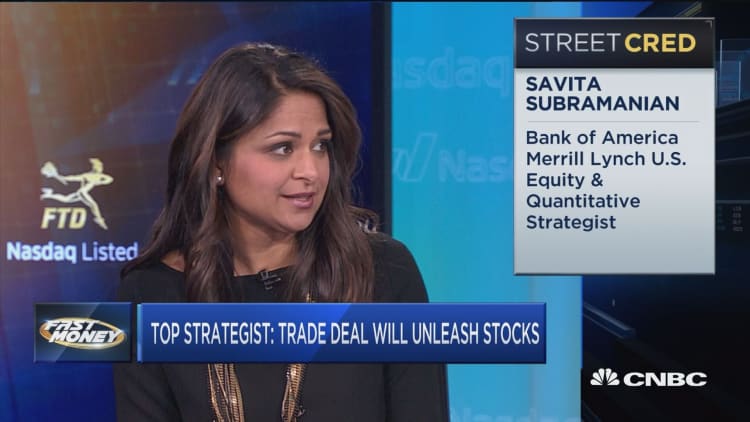
The has potential to rally as much as 10 percent from current levels if the United States and China come to terms on a trade agreement that's "the real deal," Bank of America's Savita Subramanian told CNBC.
"A partial deal, which is no new tariffs but we don't roll back any 2018 tariffs, that's largely priced in, and I would sell the news on that one. I think the market might sell up a little bit," the Merrill Lynch head of U.S. equity and quantitative strategy said Tuesday on "Fast Money." "But if we get the real deal ... that would add at least 1 or 2 percentage points of earnings growth to 2019 that's not in the numbers."
A real deal, Subramanian explained, would mean cutting all tariffs that the U.S. and China imposed on each other last year, and an agreement on intellectual property theft. Trade tensions began to rise between the world's two largest economies when President Donald Trump first placed tariffs on billions of dollars worth of Chinese goods that sparked retaliation. In a series of moves, the U.S. put duties on $250 billion worth of Chinese imports and China has targeted tariffs on $110 billion worth of U.S. products.
Trump said his goal in negotiating a new trade agreement is to address the mounting trade deficit with China and to stop Chinese companies from stealing intellectual property. Markets rose slightly Tuesday on his comments that talks are progressing and that a March 2 trade deadline could be pushed back. If not, more tariffs on Chinese products would go into effect.
Subramanian pointed out that companies have cut capex guidance "pretty dramatically," but an end to the trade war and progress on intellectual property could do a lot, particularly for tech companies, which she said may be the most important "piece of the puzzle."
"I think all the animal spirits that were negative for the last 12 months could actually flip back to positive. You could see growth trends resume, etc.," she said. "But that's predicated on the assumption that we get full deal."
With a more vibrant economy, Subramanian acknowledged that the Federal Reserve could be more inclined to hike interest rates. Companies that have benefited from "super low levels" would be able to "tolerate" higher rates, she said, adding that it won't "ruin the corporate balance sheet" of the average S&P security.
"So I think that you know if we get to a point where some of the trade friction is resolved, we have a healthier economy, we have companies starting to spend on capex, you know all of the animal spirits unwind[ing] again, the Fed can actually tighten without totally destroying the markets," Subramanian said.
The S&P 500 saw a slight gain Tuesday closing at 2,779.76.


